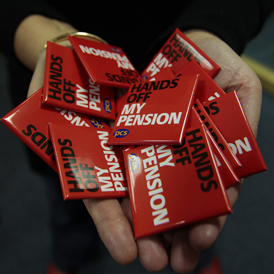Two million public workers take to the picket lines
As the biggest strike for over 30 years gets under way, TUC General Secretary Brendan Barber tells Channel 4 News that the action is not badly timed.

Schools, hospitals, courts, transport and government are all set to be hit by a walk-out involving up to 2 million workers.
Nurses, paramedics, cleaners, porters and receptionists at Birmingham Women’s Hospital were among those who began their action at midnight in the row over pensions.
Picket lines were being mounted outside thousands of schools, hospitals, jobcentres, courts and other buildings, while more than 1,000 rallies and other demonstrations are to be held across the UK.
John Longworth, director general of the British Chambers of Commerce, said the strike was “irresponsible and reckless”, adding: “Trade unions are living in a bubble and ignoring the fact that Britain has to make its way in a competitive world.”
Weather forecasting staff at the Met Office, workers at the Royal Fleet Auxiliary, catering employees in the Commons and museum curators are among those due to join the strike.
Queues are expected to build up at airports, no ferries will run to or from Shetland, the metro in Newcastle will not run, and the Mersey tunnels will close, disrupting the 80,000 motorists who drive through every day.
Disruption at a glance
• More than half of England’s 21,700 state schools (58 per cent) are closed, with a further 13 per cent partially shut, the Department for Education believes. Around 13 per cent are open.
• It is thought that immigration controls at Heathrow airport are at two-thirds of normal staffing levels.
• Hospital managers will postpone about 5,000 non-emergency operations.
• Calls to 999 will still be answered, but people are urged to only use the service in genuine emergencies.
Union leaders will travel to towns and cities across the country in a show of support for the strikers, many of whom will be going on strike for the first time.
Workers ranging from lollipop ladies and refuse collectors to headteachers and nuclear physicists will take action on the biggest day of industrial unrest since the 1979 “winter of discontent”.
There has been criticism that the strike is poorly timed, with Britain on the precipice of another recession and the eurozone crisis.
But speaking to Channel 4 News, the TUC’s Brendan Barber rejected the accusations of bad timing.
“We’ve been negotiating for many months, since start of the year, in fact, so this has not come about all of a sudden,” he said.
“I would say to those who talk about bad timing that the government’s picked a fight with us, not us with them.”
Mr Barber said that he was pleased with initial reports of turnout at the picket lines.
“The reports we’re getting from around the country are very positive, but we’re not sure of the exact numbers, from every part of the public services, from low-paid women workers to professional workers who believe strongly in this issue,” he said.
He also countered claims by Cabinet Minister Francis Maude and Chancellor George Osborne that the economy will take a £500m hit from the strikes and that job losses will result.
“[Maude’s] claim of how much the economy will suffer is spurious and sounds made up to us and hasn’t any basis. This is not about causing disruption, this is about the bad decisions the government has made,” he said.
Mr Barber pledged that if the industrial action did not force the government’s hand, more action was in the offing.
“We will obviously try to resolve this dispute through negotiations in the coming weeks, but we will strike again if they fail to and are therefore forced to do so again,” he said.
Labour leader Ed Miliband said he has “huge sympathy” for those whose lives will be affected by the strikes, but said he is “not going to condemn the dinner ladies, nurses, teachers who have made the decision to go on strike because they feel they have been put in an impossible position by a government that has refused to negotiate properly”.
-
Latest news
-
Taylor Swift’s new break-up album breaks records3m

-
NHS trust fined £200K for failings that led to death of two mental health patients3m

-
Sunak vows to end UK ‘sick note culture’ with benefit reform3m

-
‘Loose talk about using nuclear weapons is irresponsible and unacceptable’, says head of UN’s nuclear watchdog3m

-
‘There wasn’t an Israeli attack on Iran,’ says former adviser to Iran’s nuclear negotiations team7m

-




